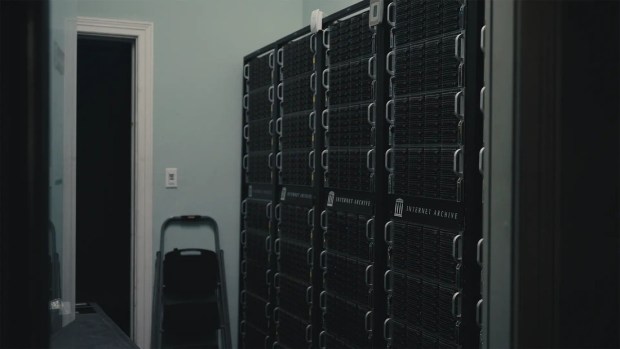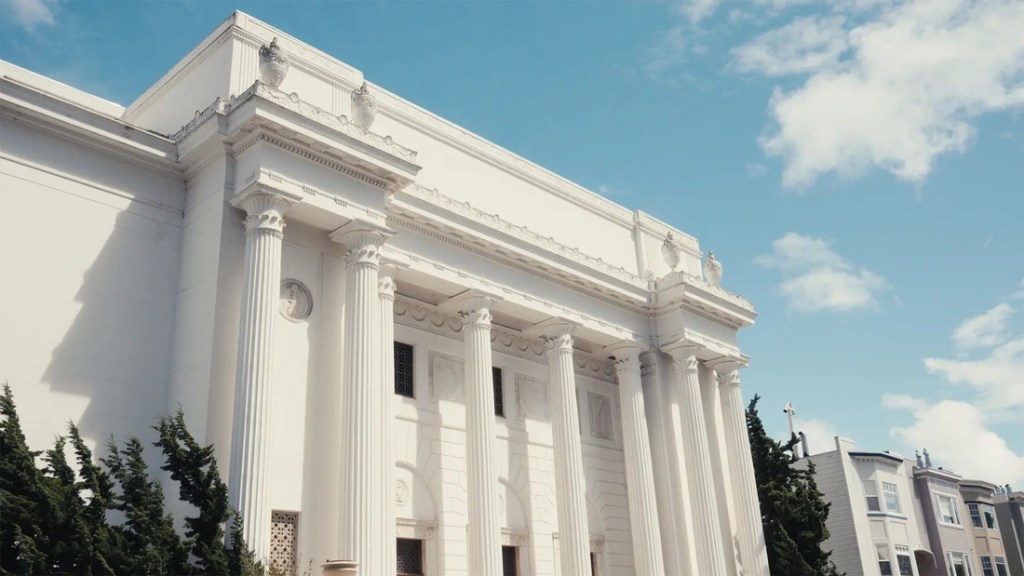Behind a grand white column-fronted building in San Francisco, once the home to a Christian Scientist church, a group of dedicated people are working to preserve history and allow “universal access to all knowledge.”
Earlier this year, four filmmakers from Tam High School decided to document the work of the Internet Archive, a nonprofit library of millions of free texts, movies, software, music, websites and more — a collection larger than the Library of Congress. And the Internet Archive’s Wayback Machine saves webpages across the internet and stores archived versions in a searchable online database; more than 950 billion pages can be accessed to this day.
A portion of the servers holding the Internet Archive’s vast data collection lies within the San Francisco building; each time someone accesses a book, website, movie, song or other file, a light flashes, something that’s captured in “404: An Internet Archive Documentary,” the new short documentary by Tam High seniors James Barbash and Jacob Stoelting and Tam High alums Teddy Vernali and Mason Dali, who made this while they both were seniors at the school.
“We just want people to see how important it is,” Barbash said, “and spread what they’re doing because what they’re doing is so important, and they’re not getting enough recognition, I think, for it.”
The short film will be shown as part of the Mill Valley Film Festival’s showcase of short films at 1 p.m. Sunday at the Sequoia Cinema in Mill Valley. Admission is $12; get tickets at mvff.com.
This youth-produced shorts program, featuring films from the United States, Romania, China, Serbia and Iran, “celebrates inventive storytelling and imaginative worlds,” according to the Mill Valley Film Festival. “These shorts explore the humor and heart of their characters, capturing moments both whimsical and profound.”
The film was done as part of Tam High School’s Academy of Integrated Humanities and New Media (AIM) program, a two-year program starting in 11th grade at the school. Each semester, students have around seven weeks to make a film surrounding a prompt. For the “404” filmmakers, this was a collaborative effort, setting up interviews, networking, creating interview questions, storyboarding and giving feedback while sitting around a monitor in class.
“The prompt was ‘need for change,’” said Barbash, whose interest in film and sports editing led him to the AIM program. “We then try to find a local story that fits that prompt.”
 A scene from “404.” (Courtesy of Mill Valley Film Festival)
A scene from “404.” (Courtesy of Mill Valley Film Festival)
As they reflected on what topic to make their documentary on, Vernali chimed in.
“His sister had gone on a tour there before,” said Stoelting, who loves to take photos and made videos before enrolling in the AIM program. “She notified him that there was this cool place in San Francisco. And then Teddy told us about it, and we’re like, oh, that’s something that has some meaning and it has impact and influences stuff that’s going on right now. And it feels like it would be attainable to make this in the short time period we have.”
The documentary shares a few examples of its impact; for example, the Internet Archive is currently the only place where the public can find a copy of an interactive timeline detailing the events of Jan. 6. The timeline, which was a product of a congressional committee that investigated Jan. 6, was removed — but is still available thanks to the nonprofit’s work.
“A lot of people don’t know about this stuff that’s happening,” Stoelting said. “We have like three or four examples in the doc and there’s so many other examples of the same stuff happening all over.”
The film features parts of a tour of the Internet Archive, which the nonprofit hosts for free on Fridays, and interviews with founder Brewster Kahle and Mark Graham, director of the Wayback Machine.
The filmmakers are proud to be able to showcase the film at their hometown festival.
“I was shocked when we found out that we were a part of it,” Barbash said. “I’ve gone to see some of the films at the film festival over the years, and it’s a really big honor. … I would just hope that people see how important it is and the importance behind it and preserving our history.”

